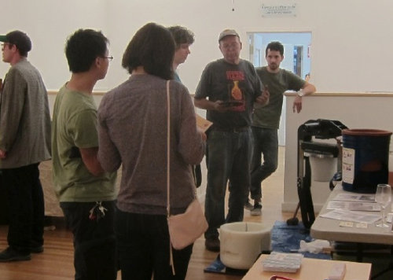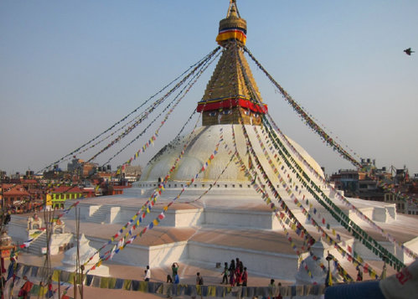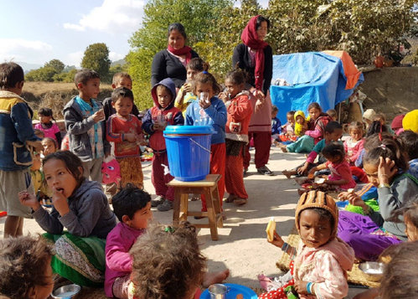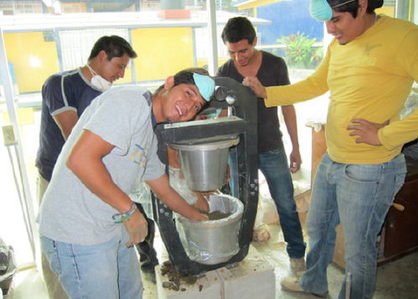
WHAT WE DO
EDUCATION & TRAINING.
Education and training efforts are recognized by Ceramic Water Filter Solutions to be an important part of our mission. The Ceramic Water Filter Training Center was established to teach others about ceramic water filters and is a vital part of achieving our mission to give everyone access to safe and healthy drinking water.
MAKING FILTERS.
Ceramic Water Filter Solutions has standardized a reliable method for manufacturing a ceramic filter that will produce affordable clean water and can be installed directly in the home, at the point of use, avoiding contamination in collection and transit. The filter is made by mixing a local clay with a combustible material like sawdust, then forming the container using a press and molds. The filter is then fired to approximately 860 degrees Centigrade. The sawdust burns out leaving small cracks and pores that are large enough to allow water to pass through but too small for bacteria and protozoa. An additional safeguard is the application of a small amount of colloidal silver both inside and outside of the filter.
To use it, one only needs to pour contaminated water in the top. It is a simple passive device, made locally of native materials, uses no electric, requires minimal maintenance and makes an immediate change in peoples’ lives.
The filter is made to fit into an ordinary 5 gallon plastic bucket fitted with a lid and a spigot, providing clean storage of bacteria-free water. When properly manufactured, then verified through testing, the filters will produce 99.9% bacteria free water.
DIGGING & TESTING CLAY
To begin the process, clay must be found in natural areas, preferably at sites of old or existing brickyards. A sufficient quantity must be dug to perform suitability tests and to make sample filters. The clay is then dried and crushed.
SIEVING & MIXING CLAY
The clay is sifted to a small particle size and mixed with a specific quantity of dried and sifted burnable material (sawdust, rice husks, etc.). The materials are mixed in their dried state, then water is added to form a homogeneous mix.
PRESSING & DRYING FILTERS
The mix is then pressed into molds to form the filter shape. The filters are then trimmed and given a unique number. They then must be slowly dried to avoid cracking.
FIRING & TESTING FILTERS
The dried filters are then fired in a kiln to a temperature approaching 900 degrees Centigrade. After firing the filters are soaked in water to test for leaks and then subjected to a flow test. The flow rate should be between one and three liters per hour.
USING FILTERS
The finished filters are coated with colloidal silver, subjected to microbiological testing, then placed into service inside a plastic container with a tap. In normal use the filters should prove effective at least 2 years.
WORLDWIDE FILTER WORK.
Ceramic Water Filter Solutions has found that there are a growing number of locations around the world where people are making and using ceramic water filters to have access to safe drinking water.
Learn more about how we are working with the locations listed below to develop self-sustaining solutions, provide continuing education and training and promote our goal for all developing countries – safe water is a right, not a privilege.
Cuatrociénegas - Coahuila, México
In February, 2013, an exploratory trip was made to the pueblo of Cuatrociénegas, México, to investigate the feasibility of making filters there.
Kathmandu, Nepal
We first went to Nepal in 2013 at the invitation of Fr. Joseph Thaler, MM, who has been working on social justice projects in Nepal for over 30 years. Our work began with several projects involving the thousands of migrant brickyard workers in the areas surrounding Kathmandu, particularly with Care and Development Organization (CDO) in Godavari. We returned in 2015 and 2016, to advise and assist Bishwa Karmacharya and his wife Ramila in the startup of a ceramic water filter factory in Nagdaha, Dhapakhel, Nepal.
Osun State, Nigeria
The factory in Nigeria was initiated in August, 2013 due to the efforts of Ibukunoluwa Ayoola (IBK), in Nigeria, a master potter, and members of Potters Water Action Group (PWAG) from Pittsburgh, PA. After arranging for the delivery of filter molds and press, members of PWAG visited IBK in August, 2013 and began making filters. Since then PWAG has provided ongoing financial support and technical assistance with the help of the Ceramic Water Filter Training Center. IBK has visited Pittsburgh and the Training Center several times for further training and technical assistance.
Tuxtla Gutiérrez Chiapas, México
The factory in Tuxtla was first started in January, 2012 in conjunction with Edgar Villalobos and Patty Elke, professors at UNACH. More than 10 samples of clay were tested and filters made and microbiologically tested. Subsequently, a much-needed new kiln was constructed. A general education program for the University students as well as an additional outreach program in the indigenous village of Zinacantán, were initiated.

















































































